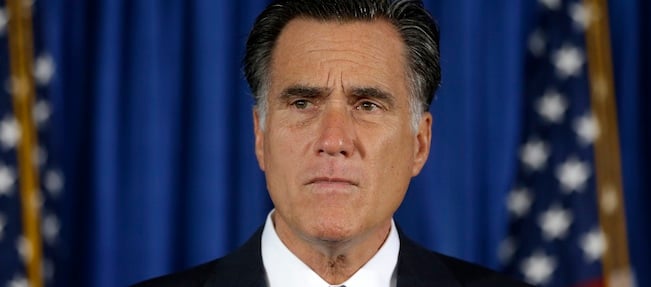Behind Mitt Romney’s response to killings in Libya
Luiza Ch. Savage looks at the Republican campaign’s foreign-policy fumble
Republican presidential candidate, former Massachusetts Gov. Mitt Romney makes comments on the killing of U.S. embassy officials in Benghazi, Libya, while speaking in Jacksonville, Fla., Wednesday, Sept. 12, 2012. (AP Photo/Charles Dharapak)
Share
 The heart of Mitt Romney’s critique of Obama’s foreign policy is the claim that Obama “apologizes” for America, and that he “leads from behind.” His differences with Obama’s foreign policy in many ways have more to do with style than substance—for example, he hasn’t offered any distinctive policies on the two most pressing foreign policy issues: Iran and Afghanistan. (Both men agree in keeping the military option on the table with regard to Iran’s nuclear progress, and Romney has not offered a different withdrawal timeline from Afghanistan than the one Obama has proposed. The most concrete policy difference is that Romney plans to increase military spending, while Obama would shrink it.)
The heart of Mitt Romney’s critique of Obama’s foreign policy is the claim that Obama “apologizes” for America, and that he “leads from behind.” His differences with Obama’s foreign policy in many ways have more to do with style than substance—for example, he hasn’t offered any distinctive policies on the two most pressing foreign policy issues: Iran and Afghanistan. (Both men agree in keeping the military option on the table with regard to Iran’s nuclear progress, and Romney has not offered a different withdrawal timeline from Afghanistan than the one Obama has proposed. The most concrete policy difference is that Romney plans to increase military spending, while Obama would shrink it.)
Obama has hardly run a soft foreign policy, between taking out Osama bin Laden and expanding the drone-based campaign of targeted killings in several countries. But on the campaign trail, you can hear disgust in Romney’s voice for Obama’s multi-lateral style of foreign policy as the Republican nominee makes the case that the president doesn’t believe in “American Exceptionalism” or that America is “the hope of the earth.”
Romney, whose campaign book is titled “No Apologies,” has also repeatedly claimed that Obama started his first term with an “apology tour” of foreign countries—a claim the fact-checking organization Politifact rates as a “Pants on Fire”-caliber falsehood,
This deep-seated personal view of Obama as an apologizer seems to be what is driving Romney’s behaviour in response to the savage killings of U.S. diplomats in Egypt and Libya.
Around midday yesterday, somebody at the U.S. Embassy in Cairo issued a statement condemning anti-Islamic “incitement” in response to growing anger in Egypt at an online trailer for a low-budget anti-Muslim film produced in the United States. The film had been used by preachers in Cairo to fan extremist hatred against the U.S.
“The Embassy of the United States in Cairo condemns the continuing efforts by misguided individuals to hurt the religious feelings of Muslims — as we condemn efforts to offend believers of all religions. Today, the 11th anniversary of the September 11, 2001 terrorist attacks on the United States, Americans are honoring our patriots and those who serve our nation as the fitting response to the enemies of democracy. Respect for religious beliefs is a cornerstone of American democracy. We firmly reject the actions by those who abuse the universal right of free speech to hurt the religious beliefs of others.”
Later that day, protests erupted in Egypt and Libya as Islamic fanatics attacked American diplomatic buildings. Four U.S. diplomats were killed in Benghazi, including the U.S. ambassador to Libya, Christopher Stevens.
Romney used the incident to attack the Obama administration in a statement late last night:
“I’m outraged by the attacks on American diplomatic missions in Libya and Egypt and by the death of an American consulate worker in Benghazi. It’s disgraceful that the Obama Administration’s first response was not to condemn attacks on our diplomatic missions, but to sympathize with those who waged the attacks.”
The statement mischaracterized the statement as being in response to the officials deaths, when it came hours before the attacks, or that it included an expression of sympathy for the attackers. (One detailed timeline is here.)
Later in the evening, the Obama administration said that the Cairo Embassy’s comments had not been cleared by Washington. And around midnight last night, the Obama campaign hit back at Romney with a statement from a spokesman:
“We are shocked that, at a time when the United States of America is confronting the tragic death of one of our diplomatic officers in Libya, Governor Romney would choose to launch a political attack.”
This afternoon, U.S. officials are saying it may have been a planned terrorist attack that included grenades and rocket launchers. Meanwhile, Romney issued another statement sticking by his earlier position:
“I also believe the Administration was wrong to stand by a statement sympathizing with those who had breached our embassy in Egypt instead of condemning their actions. It’s never too early for the United States Government to condemn attacks on Americans, and to defend our values. The White House distanced itself last night from the statement, saying it wasn’t ‘cleared by Washington.’ That reflects the mixed signals they’re sending to the world.”
However, some other senior Republicans with foreign policy clout have avoided joining Romney’s critique.
But as the candidates squabble, and the families mourn, the Libya killings are weighing heavily on Hillary Clinton. As the secretary of state, she is responsible for all American diplomats. She was also the strongest voice within the Obama administration in favor of the NATO operation in Libya. In her remarks today, she seemed personally shaken by the events.